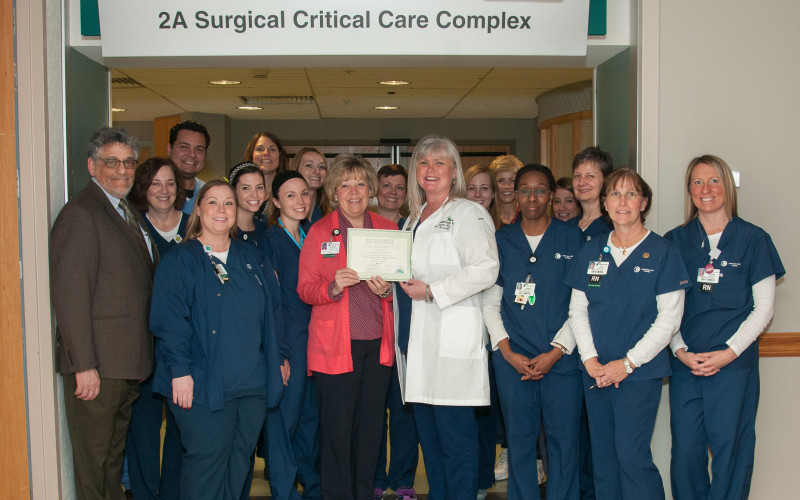Surgical Critical Care team earns Zero Harm award for 12 months CLABSI-free

The Surgical Critical Care Complex at Christiana Hospital has achieved a full year without a central-line bloodstream infection (CLABSI). The achievement earned the unit a Zero Harm Award, which recognizes the achievement of zero harm for 12 consecutive months in a specific Christiana Care Focus on Excellence patient safety harm measure by a patient care unit, clinical department or specialty, or team.
“The SCCC team embraces the concept that successful outcomes are a result of interdisciplinary team collaboration,” said Kimberly Talley, MSN, RN, CRNP CNML-BC, FABC, vice president, Patient Care Services, Surgical. “All members of the team have the same focus of patient safety and improved outcomes. They have high standards and expectations of the care that they provide, and I am truly amazed by the resilience and level of commitment and dedication of the SCCC staff.”
“It feels great!” said Louise Fagraeus, BSN, CCRN, nurse manager of the Surgical Critical Care Unit, reflecting on the achievement that is the result of constant focus and vigilance by every member of the care team. “Everybody on this unit wants to do a good job for our patients.”
Fagraeus said that a variety of key changes helped to catapult the unit to success in preventing infections. Among them were changes in central-line dressings — moving to a thicker, more durable dressing — and one-on-one staff education to ensure that everyone understood and adhered to new processes and Centers for Disease Control guidelines for infection-prevention. The team also supports each other in constant vigilance to ensure that central lines are placed properly and changed or removed at the optimal times.
“Engagement of the frontline staff who do the work enabled the SCCC to change the culture and achieve zero harm for our patients,” said Michele Campbell, RN, MSM, CPHQ, FABC, vice president of Patient Safety and Accreditation.
Fagraeus credited nurses on her team for stepping up and engaging the entire care team to make zero CLABSIs an achievable goal. Among them were Bridget Bieber, RNIII, MSN, CCRN, who led the planning and staff education effort, and Teresa Panchisin, MSN, APN, ACNS. It was Panchisin’s idea to take a soap that was recommended for prevention of urinary-tract infections and use it for full-body bathing of patients, which is another process change that the team believes contributed to their success.
“The nursing care on this unit is amazing,” Bieber said. “This is a very challenging population to keep infection-free, because of the amount of central lines that are used in the SCCC.”
The SCCC team built on the success of previous Zero Harm Award winners. Collaboration with Christiana Care’s other intensive-care units enabled the SCCC team to learn what was working in other areas of the hospital and apply those lessons to the surgical environment.